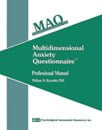
Multidimensional Anxiety Questionnaire maq
For: Quickly screen for symptoms of anxiety in ages 18-89 years
Reading Level: Adult - Elder Adult
Format: Paper-and-Pencil
Length: 10 minutes to administer; 5 minutes or less to score
Scoring: Hand Scored
Printed Kits
Click to browse products
Printed Forms & Handscoring Materials
Test forms, response booklets and scoring reference manuals.
MAQ Introductory Kit
MAQ Booklets (25)
MAQ Profile Forms (50)
Author
William M. Reynolds, PhD
Description
The MAQ is a 40-item multidimensional self-report measure of a wide range of anxiety symptoms. Designed for use with adults ages 18-89 years, this instrument is composed of the MAQ Total scale that provides a global assessment of anxiety symptomatology and four subscales that measure Physiologic-Panic, Social Phobia, Worry-Fears, and Negative Affectivity domains of anxiety.
The MAQ Total scale allows for a reasonably comprehensive evaluation of an individual’s level of anxiety based on this brief self-report. The four symptom domains assessed are Physiological-Panic (12 items), Social Phobia (9 items), Worry-Fears (10 items), and Negative Affectivity (9 items). The MAQ Total scale also provides a cutoff score to assist in identifying individuals likely to have a clinically relevant level of anxiety symptomatology.
The MAQ was developed with 600 community adults; 407 psychiatric outpatients diagnosed with anxiety-related or other disorders, and over 1,800 college students.
The MAQ, as a specific measure of anxiety, is useful in clinical situations either by itself or as part of a broader psychopathological assessment battery. It can be used in private practice, hospitals, or other clinical settings, and can be especially valuable in general medical settings, such as HMOs, where research suggests a significant proportion of general care patients demonstrate clinical levels of anxiety or anxiety disorders that often go on unrecognized and untreated.
The MAQ is also well adapted for use in college settings. Anxiety problems are a major source of psychological distress for students because of the high levels of stress often associated with courses, environmental pressures, and peer pressures. The MAQ provides an efficient, cost-effective method to screen large groups for intervention and prevention programs.
Features
Evaluates DSM-IV symptoms of anxiety in adults
Measures four domains of anxiety: Physiological-Panic, Social Phobia, Worry-Fears, and Negative Affectivity
Separate norms for community adults and college students
Useful for mental health and clinical professionals and researchers
Rapidly screens for presence and severity of anxiety symptoms
Reliability/Validity
The MAQ is highly reliable and valid. For the total development sample, there were high alpha coefficients of .96 for the MAQ Total scale and coefficients ranging from .88-.91 for the MAQ subscales. Test-retest reliability is also very high (.95 for the MAQ Total scale, .90-.93 for the subscales). Extensive content, criterion-related, construct, and factorial validity information is presented in the Manual. The MAQ shows a high correlation with the Hamilton Anxiety Scale clinical interview (r = .85). Clinical validity is demonstrated by the strong diagnostic efficacy of the MAQ cut-off score.
Administration/Scoring
MAQ materials consist of the MAQ Professional Manual, the MAQ Booklet, and the MAQ Profile Form. The MAQ Booklet is an easy-to-score, carbonless form with 40 items that measure the severity of anxiety-related symptoms. Items are written at a 4th-grade reading level. Administration takes approximately 10 minutes and scoring takes less than 5 minutes.
The MAQ Professional Manual describes the test development, psychometric characteristics, and descriptions of the standardisation and clinical development samples. The Manual also provides administration, scoring and interpretation guidelines, case illustrations and clinical caveats.
NB: Prices are in Australian dollars inclusive of GST. NZ customers need to log in to view ex-GST prices.



